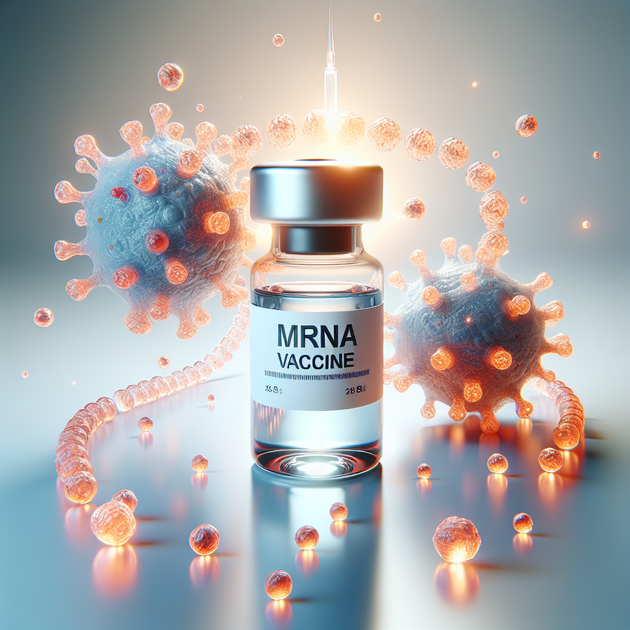Is it possible that a vaccine designed to fight a virus could also help people survive cancer? That’s the surprising question researchers are exploring right now. According to several recent studies, mRNA COVID vaccines may do more than just protect us from severe illness—they might also spark an immune response that supports cancer survival.
How Do mRNA COVID Vaccines Work?
Before diving into their potential impact on cancer, let’s break down how mRNA COVID vaccines function. Unlike traditional vaccines that use weakened or inactive viruses, mRNA vaccines use a snippet of genetic code to teach our cells how to recognize and fight the SARS-CoV-2 virus. This approach has revolutionized modern vaccine science and opened doors to new uses beyond infectious diseases.
The two most widely used mRNA COVID vaccines—Pfizer-BioNTech and Moderna—have proven highly effective in reducing severe cases of COVID-19. But here’s where things get interesting: the way these vaccines activate the immune system is similar to some leading-edge cancer immunotherapies.
What Does the Research Say About Cancer Survival?
Researchers have started noticing patterns that suggest people who received mRNA COVID vaccines may have improved cancer outcomes. For instance, a study from Germany published in Nature Medicine found that cancer patients vaccinated with mRNA shots showed enhanced immune activity against their tumors compared to those who didn’t receive the vaccine.
These findings don’t mean that mRNA vaccines are a replacement for cancer treatment, but they do suggest the immune boost from vaccination could offer additional benefits for some patients. Scientists are quick to point out that more research is needed, but early data is promising.
How Could an Immune Response Help Fight Cancer?
When you get an mRNA vaccine, your body ramps up production of specific proteins (antigens) that teach your immune system to recognize threats. This immune “training” doesn’t just target the virus—it may also help the body spot and fight abnormal cells, like cancer.
Here are a few ways this process might support cancer survival:
- Boosting T-cell activity: T-cells play a crucial role in attacking virus-infected and cancerous cells.
- Increasing immune system alertness: The heightened immune state after vaccination may help detect previously unnoticed tumor cells.
- Cross-reactivity: Some antigens generated by the vaccine might overlap with markers found on certain cancers, triggering a broader response.
- Supporting immunotherapy: For patients already receiving immunotherapy, an mRNA vaccine could act as a supportive “kickstart.”
It’s important to note that these effects aren’t guaranteed and may vary based on individual health conditions and types of cancer.
The Real-World Impact: An Anecdote from the Clinic
Take Dr. Lisa Wong, an oncologist at a major Toronto hospital. She noticed something unexpected during the pandemic: several of her patients who received mRNA COVID vaccines reported feeling stronger during chemotherapy cycles, with some even showing signs of improved tumor response. While this doesn’t prove causation, it lines up with what researchers are seeing in early studies.
Dr. Wong’s experience reflects a growing curiosity in the medical community about how existing vaccines can do more than prevent infection—they might actually support recovery in ways we’re just starting to understand.
What’s Next for mRNA Technology and Cancer?
The buzz around mRNA isn’t limited to COVID-19. Pharmaceutical companies like Moderna have already started clinical trials for personalized mRNA cancer vaccines, designed to train the immune system to target specific tumors (National Cancer Institute). While these aren’t yet available outside of studies, the concept shows how flexible and promising this technology can be.
Here’s what researchers will be watching in the coming years:
- Long-term outcomes of vaccinated cancer patients
- The safety of combining mRNA vaccines with other therapies
- New vaccine designs targeting different types of cancer
- Larger trials to confirm early findings
Final Thoughts: Could One Shot Make a Difference?
It’s too early to say if mRNA COVID vaccines will become part of standard cancer care, but their ability to spark a powerful immune response has caught researchers’ attention. As more studies roll out and new vaccines are developed, we might see a future where a single shot does more than protect against viruses—it could also help people fight off one of humanity’s toughest diseases.
What do you think? Should scientists keep exploring how existing vaccines can help with other illnesses like cancer?

Leave a Reply